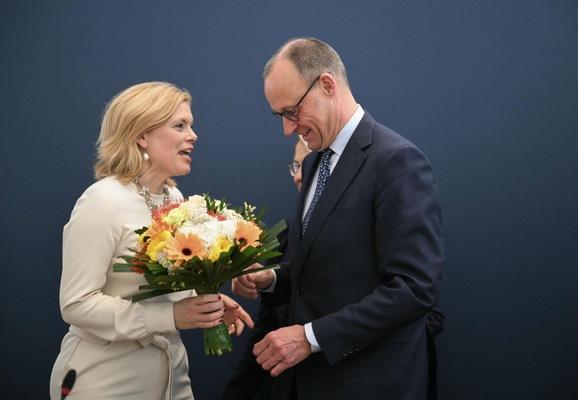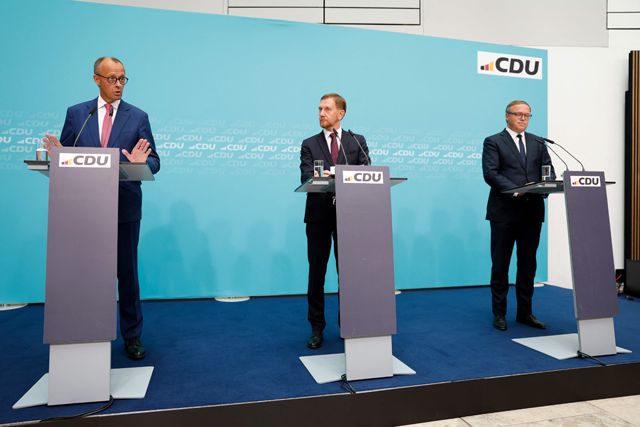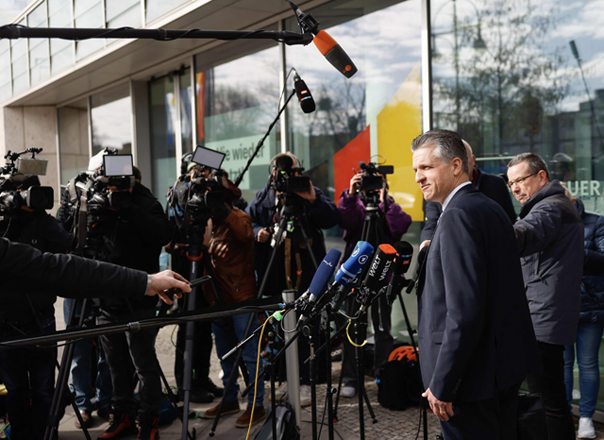You are here
German vote winner Merz faces tough talks to build govt
Feb 24,2025 - Last updated at Feb 24,2025

The leader of Germany's Christian Democratic Union (CDU) and the party's top candidate for Chancellor Friedrich Merz (L) is offered a bouquet of flowers by Federal Treasurer of Germany's Christian Democratic Union (CDU) Julia Kloeckner prior the CDU's leadership meeting at the party's headquarters in Berlin, on February 24, 2025 (AFP photo)
BERLIN - Germany's conservative election winner Friedrich Merz faced an uphill struggle to build a coalition government on Monday, a day after an election which saw a record performance by the right.
Merz has warned against more paralysis in Berlin at a time US President Donald Trump is driving head-spinning change, the German economy is in recession, and society split after a polarising campaign.
In a post on X, Merz insisted Ukraine "must be part of peace negotiations" after Trump unsettled European allies by reaching out to Russian President Vladimir Putin.
"Europe remains firmly by Ukraine's side," Merz said, as European leaders gathered in Kyiv to mark the third anniversary of Russia's full-scale invasion.
Speaking late Sunday, his victory dampened by a far-right surge, Merz had warned a united Europe must build up its own defences as he had "no illusions at all about what is coming out of America".
With over 28 percent of the vote, Merz's CDU/CSU bloc handily defeated Chancellor Olaf Scholz's Social Democrats (SPD) and the Greens, as the anti-immigration Alternative for Germany (AfD) celebrated a record of over 20 percent.
Following a heated campaign -- dominated by the flashpoint issue of immigration after a spate of deadly attacks blamed on migrants -- Merz will now have to reach out to his former campaign-trail SPD foes.
'Herculean tasks'
The conservatives will first enter talks without Scholz, who apologised for SPD's "bitter" defeat at 16 percent, while his popular defence minister, Boris Pistorius, was expected to play a more central role.
Merz must seek to establish communications with Trump, who said the conservatives' election win was a "great day for Germany" in an early response.
"The people of Germany got tired of the no common sense agenda, especially on energy and immigration," said Trump, whose surrogates have hounded Scholz's outgoing administration.
Merz will have to enter a process of horse-trading on party policies and red lines to hammer out a platform for a future governing alliance.
"These are difficult starting conditions for a new German government, which is facing Herculean tasks in domestic and foreign policy," said Cornelia Woll of the Hertie School Berlin.
"One might hope that Germany will nevertheless be able to act quickly, so that it does not just have to watch how Trump and Putin shape the future."
After the vote, French President Emmanuel Macron said he looked forward to jointly working with Merz for a "strong and sovereign Europe", while Ukrainian President Volodymyr Zelensky said he looked forward to working with Germany to "strengthen Europe".
Germany's political crisis was sparked by feuding in Scholz's three-way alliance, which broke apart on November 6, the day Trump was re-elected.
Woll said "Germany has chosen the conservative turn, but forming a government could be difficult" after the CDU/CSU fell almost two points short of their goal of 30 percent.
'Disappointed and frustrated'
Provisional results early Monday suggested Merz had dodged a bullet after the "left-wing conservative" Sahra Wagenknecht Alliance (BSW) appeared to have missed by a sliver the five-percent cut-off mark for entry into the Bundestag.
Fewer parties make it easier to gain a majority, and having the BSW in parliament would have forced him into a bumpy three-party coalition like the one Scholz led.
The liberal FDP, which sparked Scholz's government collapse, also narrowly missed the five-percent hurdle and crashed out of the Bundestag.
Whatever happens, Merz and all other parties have vowed to reject the AfD's overtures and keep them out of power, behind a "firewall" of non-cooperation.
Alice Weidel, the AfD's chancellor candidate for the election, on Monday called for other parties to drop their policy of refusing to cooperate with her party.
"They cannot exclude millions of voters. That is undemocratic. The firewall must go -- no functioning democracy has a firewall," she said.
Joerg Seiffert, 69, a therapist in Berlin, said he was "very disappointed and frustrated by the rise of the AfD".
"The worst thing would be if the CDU were to join forces with the AfD after all. And I really don't know today whether it wouldn't actually happen," he said.
Pensioner Marlies Schaefer, 74, said it was "good that Merz won the election" but "I would have thought he would have won by more."
Related Articles
BERLIN — Germany's conservative CDU/CSU alliance led by Friedrich Merz won Sunday's elections with between 28.5 and 29 percent of the vote,
BERLIN — German Chancellor Olaf Scholz on Monday urged mainstream parties to avoid working with the far right, after record gains by the AfD
BERLIN — German politicians in talks to form a new coalition government under conservative chancellor-in-waiting Friedrich Merz voiced hope














